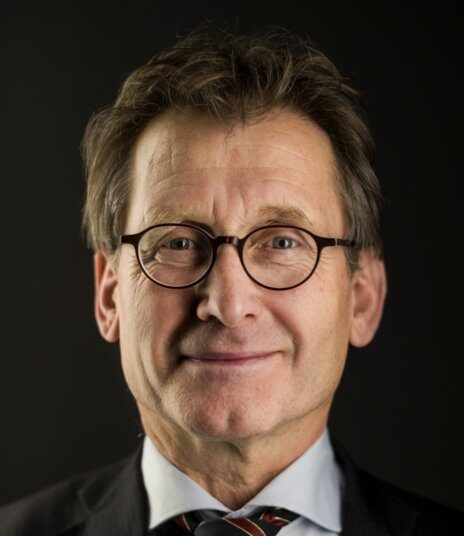27th Hermann Staudinger Lecture with Nobel Laureate Ben Feringa
The Art of Building Small. From Molecular Switches to Motors
The fascinating molecular motors and machines that sustain life offer a great source of inspiration to the molecular explorer at the nanoscale. Among the major challenges ahead in the design of complex artificial molecular systems is the control over dynamic functions and responsive far-from-equilibrium behaviour. Chemical systems ultimately require integration of structure, organization and function of multi-component dynamic molecular assemblies at different hierarchical levels. A major goal is to achieve and exploit translational and rotary motion.
In this presentation the focus is on the dynamics of functional molecular systems as well as triggering and assembly processes. We design switches and motors in which molecular motion is coupled to specific functions. Responsive behaviour will be illustrated in self-assembly and photopharmacology. The design, synthesis and functioning of rotary molecular motors and machines will also be presented with a prospect toward future dynamic molecular systems.
Report on the lecture
It was a great honor to welcome Professor Ben Feringa from the Stratingh Institute for Chemistry at the University of Groningen as the speaker of the 27th Hermann Staudinger Lecture at FRIAS. In 2016, Ben Feringa together with Sir J. Fraser Stoddart and Jean-Pierre Sauvage, was awarded the 2016 Nobel Prize in Chemistry, for “the design and synthesis of molecular machines”.
Ben Feringa started his talk on “The Art of Building Small. From Molecular Switches to Motors” by encouraging young researchers to be innovative and creative. He introduced how Hermann Staudinger demonstrated the existence of polymers by the idea to change the building blocks from a few to ten thousand, reaching high complex and completely different properties. He emphasized the importance to solve fundamental questions and then learn from them. For example, we might not have had aircrafts today if people had not tried to mimic and investigate how birds fly. Also, with great innovation, smart phones came to our life just 50 years after the invention of silicon chips. Therefore, we should keep in mind that fundamental research as the cornerstone of applied disciplines plays a crucial role in broadening our horizons and has a profound influence on the industrialisation of advanced technology. In other words, it is able to greatly promote the progress of thoughts, accelerate the birth of new industries, and thus improve the ability of mankind to understand and transform the world.
Ben Feringa told us that the best way to do research, is to enjoy the beauty of science. He continued the lecture by sharing his story about the first molecule he synthesized, which, as he said, was useless but beautiful, and he was very proud of it. We were all impressed by his great passion towards science. Humans are good at manufacturing materials and devices, but it is still difficult for people to make dynamic functions similar to biological processes. Ben Feringa explained that his favorite molecule in the human eye is the retina, which shows reversible light switching. This gives him inspiration to create artificial stimuli-responsive switching systems as molecular information storage devices.
Inspired by nature, Ben Feringa further introduced artificial switches for writing information. Materials with photo-switches, show great advantage for light stimulated on-spot drug release for smart pharmaceutics, especially by red or infrared light responsive systems, because red and infrared light can easily and harmlessly penetrate body tissues. Although it is still difficult to find any practical application for the molecular machine at this present time, he encouraged the young researchers to follow their passion and look into the future. He also mentioned that to mimic the natural process, out of equilibrium is the key. Non-equilibrium molecular machine systems are a fascinating topic for the future that inspires researchers to switch from molecules to dynamic molecular systems. In order to control motion at the nano-scale and achieve non-equilibrium phenomena, Ben Feringa’s research group developed a wide variety of molecular switches and motors, which open routes for applications such as roving sensors, delivery systems, micro-/nano robots, and precision therapeutics.
All their studies on molecular switches have established the concept of light-driven rotary motors with controlled direction and fast speed. Ben Feringa explained why he would focus on molecular machines that rotate like car motors; Inspired by the machines in our body that enable transport and allow us to lift our arms, he and his group paid great efforts to develop tiny molecular machines. Ben Feringa further introduced the nanocar, which was also developed by his group. He clarified how to control the rotary motion of the molecular motors as well as the direction. Not limited to a unidirectional rotary molecular motor, they can also tune the rotary speed from 1 per hour to 10 million per second. Ben Feringa described his first motor surfaces and films, which he envisioned to be useful for self-cleaning glass and cars, as well as mimicking muscle movements.
During the rest of his lecture, a multitude of fascinating ideas were introduced to encourage the young scientists that were present to follow their dreams with confidence. Ben Feringa’s insights into the invention of molecular machines and future perspectives as well as his kind encouragement to the young researchers, was highly appreciated by the audience. An appreciation that was expressed by a warm applause and a very lively discussion afterwards.
(by Jie Deng and Wei Liu, Institute for Macromolecular Chemistry, University of Freiburg)
When?
25.04.2019
16:15-17:45
Where?
FRIAS, Albertstr. 17, Anatomy Lecture Hall
Contact
E-Mail: Dr. Britta Küst
+49 (0)761 203-97407
